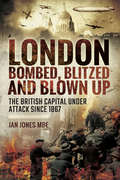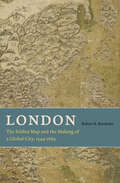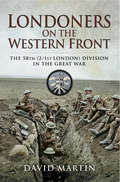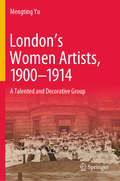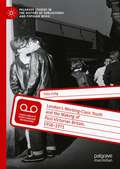- Table View
- List View
London: Immigrant City
by Nazneen Khan-ØstremTRANSLATED BY ALISON McCULLOUGH'One of the best books on the many diverse migrations to London . . . revealing the extent to which the diversity of immigrant origins has had transformative effects - through food, music, diverse types of knowledge and so much more. The book is difficult to put it down'Saskia Sassen, The Robert S. Lynd Professor of Sociology, Columbia University, New York'The ultimate book about Great Britain's capital'Dagbladet'One of the best books of the year! . . . This is a book about what a city is and can be'AftenpostenIs there a street in London which does not contain a story from the Empire? Immigrants made London; and they keep remaking it in a thousand different ways. Nazneen Khan-Østrem has drawn a wonderful new map of a city that everyone thought they already knew. She travels around the city, meeting the very people who have created a truly unique metropolis, and shows how London's incredible development is directly attributable to the many different groups of immigrants who arrived after the Second World War, in part due to the Nationality Act of 1948. Her book reveals the historical, cultural and political changes within those communities which have fundamentally transformed the city, and which have rarely been considered alongside each other.Nazneen Khan-Østrem has a cosmopolitan background herself, being a British, Muslim, Asian woman, born in Nairobi and raised in the UK and Norway, which has helped her in unravelling the city's rich immigrant history and its constant ongoing evolution.Drawing on London's rich literature and its musical heritage, she has created an intricate portrait of a strikingly multi-faceted metropolis. Based on extensive research, particularly into aspects not generally covered in the wide array of existing books on the city, London manages to capture the city's enticing complexity and its ruthless vitality.This celebration of London's diverse immigrant communities is timely in the light of the societal fault lines exposed by the Covid-19 pandemic and Brexit. It is a sensitive and insightful book that has a great deal to say to Londoners as well as to Britain as a whole.
London: Immigrant City
by Nazneen Khan-ØstremTRANSLATED BY ALISON McCULLOUGH'One of the best books on the many diverse migrations to London . . . revealing the extent to which the diversity of immigrant origins has had transformative effects - through food, music, diverse types of knowledge and so much more. The book is difficult to put it down'Saskia Sassen, The Robert S. Lynd Professor of Sociology, Columbia University, New York'The ultimate book about Great Britain's capital'Dagbladet'One of the best books of the year! . . . This is a book about what a city is and can be'AftenpostenIs there a street in London which does not contain a story from the Empire? Immigrants made London; and they keep remaking it in a thousand different ways. Nazneen Khan-Østrem has drawn a wonderful new map of a city that everyone thought they already knew. She travels around the city, meeting the very people who have created a truly unique metropolis, and shows how London's incredible development is directly attributable to the many different groups of immigrants who arrived after the Second World War, in part due to the Nationality Act of 1948. Her book reveals the historical, cultural and political changes within those communities which have fundamentally transformed the city, and which have rarely been considered alongside each other.Nazneen Khan-Østrem has a cosmopolitan background herself, being a British, Muslim, Asian woman, born in Nairobi and raised in the UK and Norway, which has helped her in unravelling the city's rich immigrant history and its constant ongoing evolution.Drawing on London's rich literature and its musical heritage, she has created an intricate portrait of a strikingly multi-faceted metropolis. Based on extensive research, particularly into aspects not generally covered in the wide array of existing books on the city, London manages to capture the city's enticing complexity and its ruthless vitality.This celebration of London's diverse immigrant communities is timely in the light of the societal fault lines exposed by the Covid-19 pandemic and Brexit. It is a sensitive and insightful book that has a great deal to say to Londoners as well as to Britain as a whole.
London: The Autobiography
by Jon E. LewisIn London: The Autobiography the life of the capital is told, for the first time, by those who made it and saw it at first hand. From Roman times to the 21st century, Londoners and visitors to the city have recounted the extraordinary events, everyday life and character of this unique and influential city - from politics, culture, sport, religion, and reportage. This book brings to vivid life the human trial of the capital including invasions by the Vikings, the brutal execution of Sir Thomas More, the sight of a whale swimming up the Thames and the rebuilding of St Paul's by Sir Christopher Wren, as well as the everyday life of the city. Includes contributions from George Orwell, Martin Amis, Dr Johnson, Karl Marx, Winston Churchill, Fyodor Dostoyevsky, Virginia Woolfe, George Melly, Tacitus, Samuel Pepys and many others. Packed with personality and character, this book is a must-buy for anyone interested in London as well as a wonderful story of the city at the heart of the nation.
London: The Biography
by Peter AckroydAn abridged edition of Peter Ackroyd's magisterial biography of the city of London Prize-winning historian, novelist and broadcaster, Peter Ackroyd takes us on a journey - historical, geographical and imaginative - through the city of London. Moving back and forth through time, Ackroyd is an effortless, exuberant guide to times of plague and pestilence, fire and floods, crime and punishment, and sex and theatre. He brings the ever changing streets alive for the reader and shows us what lies beneath our feet and above our heads. His biography is as rich in detail and fizzing with vitality as the city itself.
London: The British Capital Under Attack Since 1867
by Ian JonesWhen it comes to being bombed, London is unique. Although it cannot claim to be the most bombed capital city in terms of the weight of explosive detonated it has endured the most varied and unrelenting attack since the discovery of explosives. From the first Irish Republican bomb in 1867, London and its population have been under almost constant assault. Terrorism features in virtually every decade from the 1860s to the present and has caused much damage, particularly during the late 1980s and early 1990s. However, by far the greatest destruction was from the air. The Zeppelin and Gotha bomber raids in the First World War being but a foretaste of what would happen in the Second. Then the capital was devastated, firstly by the Luftwaffes aeroplanes and then Hitlers vengeance weapons, the V-1s and V-2s. After the Second World War the bombers returned, in the form of the IRA and then the home-grown terrorists of 2005. Written by a former Explosives Officer who worked for the Counter Terrorism Command of the Metropolitan Police, this is the most comprehensive and record of Britains capital under attack that has ever been compiled.
London: The Novel (Orient Express Ser.)
by Edward Rutherfurd"A TOUR DE FORCE . . . LONDON TRACKS THE HISTORY OF THE ENGLISH CAPITAL FROM THE DAYS OF THE CELTS UNTIL THE PRESENT TIME. . . . BREATHTAKING."--The Orlando SentinelNow in a handsome new trade paperback edition, here is Edward Rutherfurd's classic novel of London, a glorious pageant spanning two thousand years. He brings this vibrant city's long and noble history alive through the ever-shifting fortunes, fates, and intrigues of half-a-dozen families, from the age of Julius Caesar to the twentieth century. Generation after generation, these families embody the passion, struggle, wealth, and verve of the greatest city in the world."REMARKABLE . . . The invasion by Julius Caesar's legions in 54 B.C. . . . The rise of chivalry and the Crusades . . . The building of the Globe theatre . . . and the coming of the Industrial Revolution. . . . What a delightful way to get the feel of London and of English history. . . . We witness first-hand the lust of Henry VIII. We overhear Geoffrey Chaucer deciding to write The Canterbury Tales. . . . Each episode is a punchy tale made up of bite-size chunks ending in tiny cliffhangers."--The New York TimesFrom the Trade Paperback edition.
London: The Selden Map and the Making of a Global City, 1549–1689
by Robert K. BatchelorA historian recounts the unlikely rise of a world capital, and how its understanding of Asia played a key role. If one had looked for a potential global city in Europe in the 1540s, the most likely candidate would have been Antwerp, which had emerged as the center of the German and Spanish silver exchange as well as the Portuguese spice and Spanish sugar trades. It almost certainly would not have been London, an unassuming hub of the wool and cloth trade with a population of around 75,000, still trying to recover from the onslaught of the Black Plague. But by 1700, London&’s population had reached a staggering 575,000 and it had developed its first global corporations, as well as relationships with non-European societies outside the Mediterranean. What happened in the span of a century and half? And how exactly did London transform itself into a global city? London&’s success, Robert K. Batchelor argues, lies not just with the well-documented rise of Atlantic settlements, markets, and economies. Using his discovery of a network of Chinese merchant shipping routes on John Selden&’s map of China as his jumping-off point, Batchelor reveals how London also flourished because of its many encounters, engagements, and exchanges with East Asian trading cities. Translation plays a key role in Batchelor&’s study—not just of books, manuscripts, and maps, but also of meaning and knowledge across cultures. He demonstrates how translation helped London understand and adapt to global economic conditions. Looking outward at London&’s global negotiations, Batchelor traces the development of its knowledge networks back to a number of foreign sources, and credits particular interactions with England&’s eventual political and economic autonomy from church and King. London offers a much-needed non-Eurocentric history of London, first by bringing to light and then by synthesizing the many external factors and pieces of evidence that contributed to its rise as a global city. It will appeal to students and scholars interested in the cultural politics of translation, the relationship between merchants and sovereigns, and the cultural and historical geography of Britain and Asia.
London: the Autobiography
by Jon E. LewisIn London: The Autobiography the life of the capital is told, for the first time, by those who made it and saw it at first hand. From Roman times to the 21st century, Londoners and visitors to the city have recounted the extraordinary events, everyday life and character of this unique and influential city - from politics, culture, sport, religion, and reportage. This book brings to vivid life the human trial of the capital including invasions by the Vikings, the brutal execution of Sir Thomas More, the sight of a whale swimming up the Thames and the rebuilding of St Paul's by Sir Christopher Wren, as well as the everyday life of the city. Includes contributions from George Orwell, Martin Amis, Dr Johnson, Karl Marx, Winston Churchill, Fyodor Dostoyevsky, Virginia Woolfe, George Melly, Tacitus, Samuel Pepys and many others.Packed with personality and character, this book is a must-buy for anyone interested in London as well as a wonderful story of the city at the heart of the nation.Praise for Jon E Lewis:'A triumph' Saul David, author of Victoria's Army'Harrowing, funny and often unbelievable book.' Daily Express[A] compelling tommy's eye view of war from Agincourt to Iraq' Daily Telegraph
Londoners on the Western Front: The 58th (2/1st London) Division on the Great War
by David MartinIn spite of all the books written on the First World War, some remarkable stories still remain untold, and that of the 58th London Division is one of the most neglected. A territorial formation, lacking the glamour of the old army or the Kitchener Volunteers, the 58th never received an official history and apart from the odd mention and a poignant memorial on the Somme battlefield depicting a rider cradling a dying horse, it has faded from memory. Yet the Division saw hard service and won through at Passchendaele where it won fame for capturing the Wurst Farm ridge many of its soldiers were decorated for this action, and the ridge afterwards renamed London Ridge in its honour. This book will tell the fascinating story of the 58th Division's war, and through this cast new light on the wider story of how the BEF struggled through the hard years and developed into such a formidable force. Passchendaele is remembered for mud and waste, but the 58th Division's experience shows the immense scale of the preparations supporting the offensive and show both how these worked and when they fell short. A history of the 58th Division is long overdue. It is also a way of bringing a good deal of new research on the war to the general reader.As featured in the Shropshire Star and Epping Forest Guardian.
Londoners: The Days and Nights of London Now—As Told by Those Who Love It, Hate It, Live It, Left It, and Long for It
by Craig TaylorResidents tell their stories in a &“kaleidoscopic portrait of a great, messy, noisy, daunting, inspiring, maddening, enthralling, constantly shifting&” city (The New York Times Book Review).Londoners is a fresh and compulsively readable view of one of the world&’s most fascinating cities—a vibrant narrative portrait of the London of our time, featuring unforgettable stories told by the real people who make the city hum. Craig Taylor has spent years traversing every corner of the capital, getting to know the most interesting Londoners, including the voice of the London Underground, a West End rickshaw driver, an East End nightclub doorperson, a mounted soldier of the Queen&’s Life Guard at Buckingham Palace, and a couple who fell in love at the Tower of London—and now live there. With candor and humor, this diverse cast—rich and poor, old and young, native and immigrant, men and women (and even a Sarah who used to be a George)—shares indelible tales that capture the city as never before. &“Fans of Studs Terkel&’s insightful oral histories will be delighted to discover a successor in Taylor . . . His book brings London to life as it is—ever changing, ever eternal, ever unforgettable.&” —Library Journal (starred review) &“A treasury of compact vignettes from voices that are rarely heard but come closer to the truth of the city than any travel brochure or official document.&” —Pittsburgh Tribune-Review &“Delightful. . . . In Taylor&’s patient and sympathetic hands, regular people become poets, philosophers, orators.&” —The New York Times Book Review &“Remarkable.&” —San Francisco Chronicle
Londontown: A Photographic Tour of the City's Delights
by Susannah ConwayLondontown is a love letter in pictures to this bustling world capital. Photographer Susannah Conway takes us beyond the familiar sights to capture an authentic local experience of the city. Readers will travel with her as she crisscrosses London, shooting all the hippest, most exciting, and most historic neighborhoods, and sampling the city's effortless cool, vibrant street life, and timeless know-how. Mixing signature Polaroid shots with modern digital photos, this insider's slice of London life will appeal both to those living half a mile from Big Ben and Anglophiles anywhere.
London’s Global Office Economy: From Clerical Factory to Digital Hub
by Rob HarrisLondon’s Global Office Economy: From Clerical Factory to Digital Hub is a timely and comprehensive study of the office from the very beginnings of the workplace to its post-pandemic future. The book takes the reader on a journey through five ages of the office, encompassing sixteenth-century coffee houses and markets, eighteenth-century clerical factories, the corporate offices emerging in the nineteenth, to the digital and network offices of the twentieth and twenty-first centuries. While offices might appear ubiquitous, their evolution and role in the modern economy are among the least explained aspects of city development. One-third of the workforce uses an office; and yet the buildings themselves – their history, design, construction, management and occupation – have received only piecemeal explanation, mainly in specialist texts. This book examines everything from paper clips and typewriters, to design and construction, to workstyles and urban planning to explain the evolution of the ‘office economy’. Using London as a backdrop, Rob Harris provides built environment practitioners, academics, students and the general reader with a fascinating, illuminating and comprehensive perspective on the office. Readers will find rich material linking fields that are normally treated in isolation, in a story that weaves together the pressures exerting change on the businesses that occupy office space with the motives and activities of those who plan, supply and manage it. Our unfolding understanding of offices, the changes through which they have passed, the nature of office work itself and its continuing evolution is a fascinating story and should appeal to anyone with an interest in contemporary society and its relationship with work.
London’s Women Artists, 1900-1914: A Talented and Decorative Group
by Mengting YuDrawing on untapped archives, as well as aggregating a wide range of existing published sources, this book recalibrates the understanding of women artists’ roles, outputs and receptions in London during what was indubitably a vibrant and innovative period in the history of British art, and in which the work of their male contemporaries is so well understood. The book takes its starting point from Alicia Foster’s article “Gwen John’s Self-Portrait: Art, Identity and Women Students at the Slade School,” published in 2000, where the expression “a talented and decorative group” was coined to describe common attitudes towards women artists in the late 19th and early 20th century London. This pejorative attribution strongly implied a status less significant to that of their male counterparts. The author challenges this statement's basic tenet by casting a wide net in examining women’s art education from the Slade School of Fine Art, through to the role of its graduates within a selection of London’s exhibition groups, societies and publications. This book also reconstructs ‘from scratch’ the role of the Women’s International Art Club (WIAC), hitherto entirely overlooked in art historical studies of the era. This book will be of interest to students and researchers in art and cultural history, gender studies,and in sociological studies of pre-War World War Britain.
London’s Working-Class Youth and the Making of Post-Victorian Britain, 1958–1971 (Palgrave Studies in the History of Subcultures and Popular Music)
by Felix FuhgThis book examines the emergence of modern working-class youth culture through the perspective of an urban history of post-war Britain, with a particular focus on the influence of young people and their culture on Britain’s self-image as a country emerging from the constraints of its post-Victorian, imperial past.Each section of the book – Society, City, Pop, and Space – considers in detail the ways in which working-class youth culture corresponded with a fast-changing metropolitan and urban society in the years following the decline of the British Empire.Was teenage culture rooted in the urban experience and the transformation of working-class neighbourhoods? Did youth subcultures emerge simply as a reaction to Britain's changing racial demographic? To what extent did leisure venues and institutions function as laboratories for a developing British pop culture, which ultimately helped Britain re-establish its prominence on the world stage?These questions and more are answered in this book.
Londres | París | Nueva York (pack digital con las tres novelas)
by Edward RutherfurdPara celebrar la publicación de China, la nueva novela de Edward Rutherfurd, publicamos esta maravilloso estuche con las tres novelas históricas que encumbraron al autor como uno de los grandes referentes del género en todo el mundo. Cada episodio de Londres, profuso en detalles históricos, revela la riqueza, la pasión, el brío y la lucha por sobrevivir de una ciudad única. Desde la fundación de un pequeño asentamiento celta a los bombardeos de la Segunda Guerra Mundial, pasando por la invasión por parte de las legiones de César en el año 54 a.d, las Cruzadas, la conquista normanda, la creación del teatro Globe en el que Shakespeare estrenaría sus obras, las tensiones religiosas, el Gran Incendio, la época victoriana... Cientos de historias mezclan a personajes reales y ficticios, pertenecientes a unas pocas sagas familiares que se perpetúan a través de los siglos. París se desarrolla a través de las historias de pasiones, lealtades divididas y secretos guardados durante años de personajes tanto ficticios como reales, con el escenario de esta gloriosa ciudad como fondo. De la construcción de Notre Dame a las peligrosas maquinaciones del cardenal Richelieu; de la resplandeciente corte de Versalles a la violencia de la Revolución francesa y las comunas parisinas; del hedonismo de la Belle Époque, cuando el movimiento impresionista alcanza su cénit, a la tragedia que supuso la Primera Guerra Mundial; de los escritores de la Generación Perdida de los años 1920 a los que se podía encontrar bebiendo en Les Deux Magots a la ocupación nazi, los luchadores de la Resistencia y la revuelta estudiantil de mayo de 1968. Un mosaico impresionante, sensual, arrebatador. Los 400 años de Historia de la ciudad de Nueva York se conforma de miles de historias, escenarios y personajes extraordinarios. Partiendo de la vida de los indios que habitaban sus tierras vírgenes y los primeros colonos holandeses hasta llegar a la dramática construcción del Empire State Building o la creación del edificio Dakota en el que vivía John Lennon. Durante la Guerra de la Independencia de los Estados Unidos, Nueva York fue territorio británico; tiempo más tarde, los neoyorquinos crearon canales y vías ferroviarias que abrieron las puertas a la America del Oeste. La ciudad ha estado en el centro del huracán en buenos y malos momentos, como lo fueron el crash del 29 o el ataque del 11 de septiembre.
Lone Bean
by Chudney RossI have a flower name . . . but it is long and hard to spell and terrible. I'll never tell anyone what it is. Mom and Dad sometimes call me by my real name when I'm in big trouble, but otherwise I'm just called Bean. Bean Gibson is so excited about the first day of third grade, not even her m-e-a-n mean older sisters, Rose and Gardenia, can bring her down. But Bean's year gets off to a bad start-her best friend, Carla, has made a new best friend, and Bean has to begin music lessons. Bean picks the violin (the cello is too big) and tries to find new friends, but music lessons are a lot of work, Goody Two-Shoes Gabrielle is prissy, and Terrible Tanisha is a bully. And Bean's mom is always at work. Bean h-a-t-e-s hates third grade! Lone Bean is an entertaining read about spunky Bean Gibson and how she learns what it means to be a good friend. And that it's possible to have more than one.
Lone Eagle: The Fighter Pilot Experience - From World War I and World War II to the Jet Age
by Philip KaplanTake someone with superior intelligence, unusual strength, perfect vision, catlike reflexes, exceptional marksmanship, and nerves of steel and you just might have what it takes. The fighter pilot had total control of an airborne vehicle traveling hundreds of miles an hour, and was capable of leaving a devastating path of destruction in his wake. Navigating with brains and stamina, making life-or-death decisions in the blink of an eye, these unique heroes succeeded or failed by their skill and wit. And although their planes have changed over the years from World War I’s precarious contraptions made of wood, wire, and cloth; to the metal monsters of the second World War, and finally to sleek, computerized birds able to cruise at speeds that exceed Mach 1 fighter pilots still must out-think and out-fly opponents in a one-on-one contest where everything is at stake. Profusely illustrated throughout with action photos, paintings, memorabilia and mementoes, Lone Eagle is a vivid volume recalling the thrill of flying Spitfires, Phantoms, Zeroes, and other fighter planes throughout aviation history. Through engaging personal stories and remembrances, this book examines the combat missions and evolution of tactics gathered over the last 70 years, where every hour of every day was an unforgettable and marvelous experience.
Lone Hawk:The Story of Air Ace Billy Bishop
by John LangCanada's greatest war hero brought vividly to life As a boy, Billy Bishop was a crack shot - he had a sharp eye and great aim. Nearly flunking out of Royal Military College in Kingston, he eagerly signed up for duty when the First World War broke out. Sent first to England, Bishop discovered his true love: the Royal Flying Corps. Up in the air, the fighting may have been "cleaner" - no trenches, no mud, no mustard gas - but it was extremely dangerous and difficult. In fact, most fighter pilots in the First World War would not shoot down even a single plane. Bishop soon proved himself to be a fighter pilot with an unerring instinct for aerial combat. He practiced relentlessly and would never land his plane before firing off every bullet, diving on targets he'd set up beforehand. The practice paid off. Bishop racked up seventy-two officially confirmed victories and was awarded every major medal, including the Victoria Cross. By the end of the war, he was considered so valuable as a symbol of the war effort that Canadian authorities insisted he be grounded: his loss would have been devastating to all Canadians. In this exciting new graphic novel, author and illustrator John Lang has unforgettably recreated Bishop's exciting wartime experiences. John Lang is an award-winning illustrator and cartoonist. He has produced work for a wide variety of publications, including Time Magazine, Billboard, Business Week, and The Village Voice. He lives and works in Toronto with his wife, Sara, and their daughter, Emily.
Lone Star
by Ed IfkovicIt's 1955, and Edna Ferber is basking in the success of her blockbuster novel Giant. Headed to Los Angeles, where director George Stevens and Warner Brothers Studio are in the final days of filming her Texas oil epic, she is looking forward to meeting Rock Hudson, Liz Taylor, and especially the young James Dean. But there is trouble brewing. Dean, the new box-office sensation and teen heartthrob, has been accused of fathering a child with an unstable (and recently fired) extra named Carisa Krausse. The studio fears the negative publicity will jeopardize the release of the movie. Then the actress is murdered, and James Dean is the prime suspect. He was seen at her apartment moments before Carisa's death. The police are ready to arrest him. With actress Mercedes McCam-bridge as her sympathetic sidekick, Edna investigates, determined to clear Dean's name. Soon Edna finds herself exploring the troubled lives of Dean's circle of disparate friends. As she delves into Hollywood's dark side she discovers a power-ful studio obsessed with a cover-up and a solution she doesn't want to accept--a solution that she, in fact, dreads.
Lone Star
by Paullina SimonsFalling in love was the easy part . . .Chloe and her three best friends are weeks away from finishing high school and beginning their new grown-up lives apart from one another. They have been friends since they were kids, their families and lives intertwined, but this is their last summer together. They plan a magical trip to sun-drenched Barcelona, with its possibility of adventure and passion. But first, Chloe has an old family promise to keep, and the four of them must detour through historic Eastern Europe.In this fledgling post-Communist world, Chloe meets a mysterious American vagabond named Johnny, who carries a guitar, an easy smile, and a lifetime of secrets. From Treblinka to Trieste, from Carnikava to Krakow, the unlikely band of friends and mismatched lovers traverses the Old World on a train ride that becomes a treacherous journey into Europe's and Johnny's dark pasts--a journey that jeopardizes Chloe's plans and all she ever thought she wanted.The ties that bind Chloe to her friends and her future are about to be put to the ultimate test. Whether or not they reach Barcelona . . . their lives will never be the same again.A sweeping, beautiful tale of old friendships and new love that mesmerizes and enchants, Lone Star will linger long in the memory even after the final page has been turned.
Lone Star (Edna Ferber Mysteries #1)
by Ed IfkovicWith a foreword by David Morrell"A pure delight." —JEFFERY DEAVER, New York Times bestselling authorIt's 1955, and Edna Ferber is basking in the success of her blockbuster novel Giant. Headed to Los Angeles, where director George Stevens and Warner Brothers Studio are in the final days of filming her Texas oil epic, she is looking forward to meeting Rock Hudson, Liz Taylor, and especially the young James Dean.But there is trouble brewing. Dean, the new box-office sensation and teen heartthrob, has been accused of fathering a child with an unstable (and recently fired) extra named Carisa Krausse. The studio fears the negative publicity will jeopardize the release of the movie. Then the actress is murdered, and James Dean is the prime suspect. He was seen at her apartment moments before Carisa's death. The police are ready to arrest him.With actress Mercedes McCambridge as her sympathetic sidekick, Edna investigates, determined to clear Dean's name. Soon Edna finds herself exploring the troubled lives of Dean's circle of disparate friends. As she delves into Hollywood's dark side she discovers a powerful studio obsessed with a cover-up and a solution she doesn't want to accept—a solution that she, in fact, dreads.
Lone Star Bride
by Carolyn DavidsonJAMES WEBSTER DIDN’T DESERVE ANY SHOT AT HAPPINESS...Not when his actions had brought suffering to others. So he sought redemption on a remote Texas ranch. The last thing he needed was trouble in the form of the ranch manager’s flirtatious, beautiful, innocent daughter, Alexis Powers.Wanting what he shouldn’t have was an altogether different matter. Alexis’s soft mouth and slender body tempted him mightily and Jamie knew that marriage was the only honorable course. But once this Lone Star lady became his bride, could he prove worthy of her love?
Lone Star Bride
by Jolene NavarroAn Unwanted Marriage Sofia De Zavala wants to help her father run their family’s Texas ranch—but he has other ideas for her future. Faced with an arranged marriage, Sofia dresses as a boy and joins a cattle drive, determined to prove herself to her father. But her plan backfires when she’s forced to save her reputation by marrying trail boss Jackson McCreed.Jackson thought he was hiring a scrappy young boy—instead, the wary widower has landed his business partner’s feisty, headstrong daughter as his bride. He believes a marriage of convenience is the best they can hope for. But Sofia dares him to look to the future again…and find a love strong enough to lasso a lifetime of happiness.
Lone Star Heiress
by Winnie GriggsRescuer Turned Husband? Plucky Ivy Feagan is headed to Turnabout, Texas, to claim an inheritance, not a widower's heart. That all changes when strapping schoolteacher Mitch Parker rescues her in the wilderness. Straightlaced Mitch has never met a woman like Ivy-beautiful, adventurous and good-hearted-but he already lost love once and doesn't dare try again. When Turnabout's gossips target Mitch and Ivy's friendship, he proposes to save her reputation. But Ivy doesn't want to marry for honor, and she doesn't need to marry for money. Ivy will only agree to a proposal made for love's sake-but will Mitch make his heart part of the marriage offer? Texas Grooms: In search of their brides...
Lone Star Heiress and The Runaway Bride
by Winnie Griggs Noelle MarchandA groom to the rescueLone Star Heiress by Winnie GriggsAdventurous Ivy Feagan is headed to Turnabout, Texas, to claim an inheritance when an accident leads to an unexpected rescue by widowed schoolteacher Mitch Parker. But when town gossips target Mitch and Ivy’s friendship, he proposes to save her reputation. Ivy doesn’t want to marry for honor and doesn’t need to marry for money. She’ll only agree to a proposal made for love’s sake!The Runaway Bride by Noelle MarchandLeaving town for a fresh start, runaway bride Lorelei Wilkins never suspects her parents will send Sheriff Sean O’Brien—the only husband she’s ever wanted—to bring her home! After an innocent mistake leaves Lorelei and her reluctant rescuer with compromised reputations, marriage is their only option. Will this inconvenient groom and stubborn bride realize that only love can conquer all?



